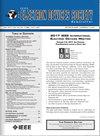了解Si - n- finet在交流正偏置温度不稳定应力下产生陷阱的频率依赖性
IF 2.4
3区 工程技术
Q3 ENGINEERING, ELECTRICAL & ELECTRONIC
引用次数: 0
摘要
本文采用快速直流-电压(DCIV)方法和基于放电的多脉冲能量谱(DMP)技术研究了交流正偏置温度不稳定性(PBTI)应力下Si n沟道场效应晶体管(n- finfet)中陷阱产生的频率(f)依赖性。实验结果表明,在交流PBTI应力下,n-FinFET的界面陷阱产生($\Delta $ NIT)和体陷阱产生($\Delta $ NOT)几乎与交流频率无关。然而,进一步分析表明,$\Delta $ NOT由Si的EC附近的浅圈闭和Si的Ev附近的深圈闭组成。此外,在125°C下,当交流偏置频率从10 Hz增加到1 MHz时,1.4V的过驱动电压(Vov)下,约22%的深陷阱减少,浅陷阱增加。本文章由计算机程序翻译,如有差异,请以英文原文为准。
Understanding Frequency Dependence of Trap Generation Under AC Positive Bias Temperature Instability Stress in Si n-FinFETs
In this paper, the frequency (f) dependence of trap generation in Si n-channel fin field-effect transistors (n-FinFETs) under AC positive bias temperature instability (PBTI) stress is investigated by fast direct-current current-voltage (DCIV) method and the discharging-based multi-pulse energy profiling (DMP) technique. The experimental results show that both interface trap generation ( $\Delta $ NIT) and bulk trap generation ( $\Delta $ NOT) of n-FinFET under AC PBTI stress are almost independent of the AC frequency. However, further analysis shows that $\Delta $ NOT consists of shallow traps near EC of Si and deep traps near Ev of Si. Moreover, about 22% of deep traps decrease with shallow traps increasing under 1.4V overdrive voltage (Vov) at 125°C with AC bias frequency increasing from 10 Hz to 1 MHz.
求助全文
通过发布文献求助,成功后即可免费获取论文全文。
去求助
来源期刊

IEEE Journal of the Electron Devices Society
Biochemistry, Genetics and Molecular Biology-Biotechnology
CiteScore
5.20
自引率
4.30%
发文量
124
审稿时长
9 weeks
期刊介绍:
The IEEE Journal of the Electron Devices Society (J-EDS) is an open-access, fully electronic scientific journal publishing papers ranging from fundamental to applied research that are scientifically rigorous and relevant to electron devices. The J-EDS publishes original and significant contributions relating to the theory, modelling, design, performance, and reliability of electron and ion integrated circuit devices and interconnects, involving insulators, metals, organic materials, micro-plasmas, semiconductors, quantum-effect structures, vacuum devices, and emerging materials with applications in bioelectronics, biomedical electronics, computation, communications, displays, microelectromechanics, imaging, micro-actuators, nanodevices, optoelectronics, photovoltaics, power IC''s, and micro-sensors. Tutorial and review papers on these subjects are, also, published. And, occasionally special issues with a collection of papers on particular areas in more depth and breadth are, also, published. J-EDS publishes all papers that are judged to be technically valid and original.
 求助内容:
求助内容: 应助结果提醒方式:
应助结果提醒方式:


